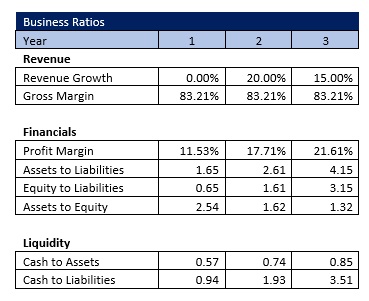Please note that the financials in this complete free business plan are completely fictitious and may not match the text of the business plan below. This free business plan demonstration purposes only. If you are interested in purchasing the completed editable MS Word and Excel documents for this business plan, please click the button below! Also, the text of the business plan is formatted with a fully automated table of contents.
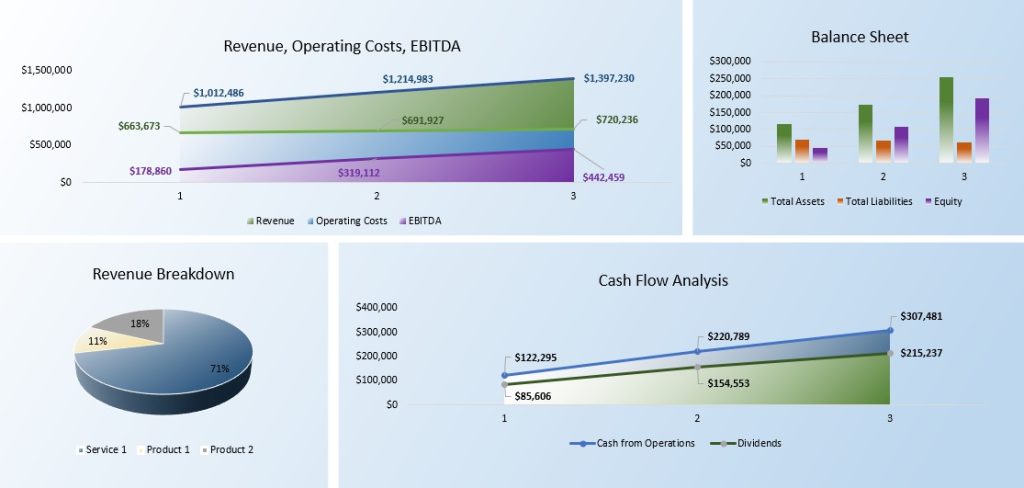
1.0 Executive Summary
The purpose of this business plan is to raise $400,000 for the development of a farm while showcasing the expected financials and operations over the next three years. Farm Inc. (“the Company”) is a New York based corporation that will produce and sell a variety of crops to farmer’s markets and produce distributors. The Company was founded by John Doe.
1.1 Operations
The Farm will produce a number of crops on a yearly basis depending on the demand for produce products. Mr. Doe anticipates that the Farm will encompass 15 to 20 acres of arable land that can be used to plant and grow a host of different produce goods. At the onset of operations, the Farm will have approximately 4 farmhands to assist with the day to day operations of the farm. The third section of the business plan will further describe the services offered by the Farm.
1.2 The Financing
Mr. Doe is seeking to raise $400,000 from as a bank loan. The interest rate and loan agreement are to be further discussed during negotiation. This business plan assumes that the business will receive a 10 year loan with a 9% fixed interest rate.
1.3 Mission Statement
The Farm’s mission is to provide its buyers with the freshest quality produce available while concurrently using economically viable and ecologically sustainable practices.
1.4 Management Team
The Company was founded by John Doe. Mr. Doe has more than 10 years of experience in the farming industry. Through his expertise, he will be able to bring the operations of the business to profitability within its first year of operations.
1.5 Sales Forecasts
Mr. Doe expects a strong rate of growth at the start of operations. Below are the expected financials over the next three years.
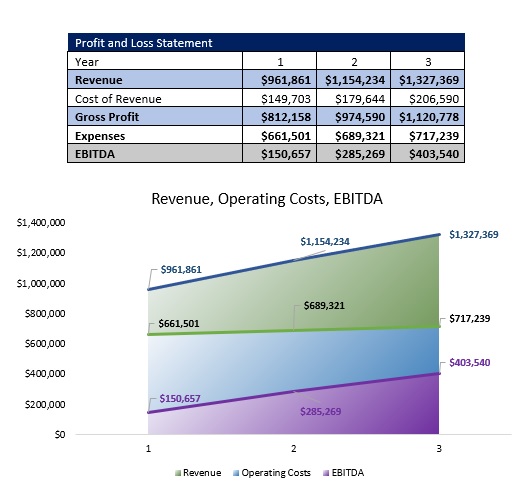
1.6 Expansion Plan
The Founder expects that the business will aggressively expand during the first three years of operation. Mr. Doe intends to implement marketing campaigns that will effectively target farmer’s markets and produce buyers within the target market.
2.0 Company and Financing Summary
2.1 Registered Name and Corporate Structure
Farm, Inc. The Company is registered as a corporation in the State of New York.
2.2 Required Funds
At this time, the Farm requires $400,000 of debt funds. Below is a breakdown of how these funds will be used:
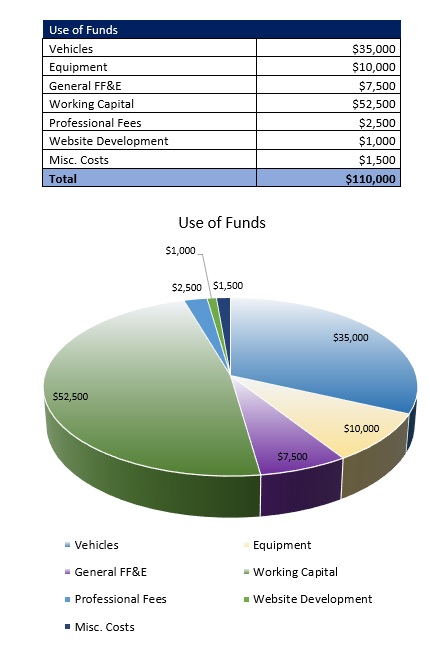
2.3 Investor Equity
Mr. Doe is not seeking an investment from a third party at this time.
2.4 Management Equity
John Doe owns 100% of Farm, Inc.
2.5 Exit Strategy
If the business is very successful, Mr. Doe may seek to sell the business to a third party for a significant earnings multiple. Most likely, the Company will hire a qualified business broker to sell the business on behalf of the Farm. Based on historical numbers, the business could fetch a sales premium of up to 3 to 5 times the previous year’s net earnings.
3.0 Operations
As stated in the executive summary, Mr. Doe intends to develop the Farm as a multi-produce property that will plant, grow, and distribute its products to farmer’s markets and produce wholesalers throughout the target market. Mr. Doe has already sourced the potential land and the equipment that will be used for the Farm’s operations. Additionally, it should be noted that Mr. Doe may join a produce coop that will assist with the distribution and sale of the Farm’s produce.
4.0 Strategic and Market Analysis
4.1 Economic Outlook
This section of the analysis will detail the economic climate, the farm/agriculture industry, the customer profile, and the competition that the business will face as it progresses through its business operations. Currently, the economic market condition in the United States is in recession. This slowdown in the economy has also greatly impacted real estate sales, which has halted to historical lows. Many economists expect that this recession will continue until mid-2010, at which point the economy will begin a prolonged recovery period. However, this should have a minimal impact on the Farm’s ability to generate revenues as much of its crops will be geared towards staple foods that are constantly in demand regardless of the general economic climate.
4.2 Industry Analysis
Within the United States, agriculture producers (of produce) generate more than $130 billion per year of revenue and provide jobs to more than 1.5 million people. Aggregate payrolls in each of the last five years have exceeded $20 billion. This is a mature industry (and one of America’s oldest industries), and the expected future growth rate is expected to mirror that of the general economy and population growth. One of the most common trends in the farming and agriculture industry is that newer technologies and genetically engineered seeds are actually increasing the net profit margins of the business while concurrently lessening the ecological impact of farming on the environment.
4.3 Customer Profile
It is extremely difficult to determine the customer profile of people that will acquire the produce produced by the Farm, Inc. The Company intends to do business with farmer’s markets, coops, and produce wholesalers that will acquire the Company’s inventories of produce. In this section of the analysis, you should describe the type of customer you are seeking to acquire. These traits include income size, type of business/occupation; how far away from your business is to your customer, and what the customer is looking for. In this section, you can also put demographic information about your target market including population size, income demographics, level of education, etc.
4.4 Competitive Analysis
This is one of the sections of the business plan that you must write completely on your own. The key to writing a strong competitive analysis is that you do your research on the local competition. Find out who your competitors are by searching online directories and searching in your local Yellow Pages. If there are a number of competitors in the same industry (meaning that it is not feasible to describe each one) then showcase the number of businesses that compete with you, and why your business will provide customers with service/products that are of better quality or less expensive than your competition
5.0 Marketing Plan
The Farm intends to maintain an extensive marketing campaign that will ensure maximum visibility for the business in its targeted market. Below is an overview of the marketing strategies and objectives of the Farm.
5.1 Marketing Objectives
- Develop relationships with major groceries and produce wholesalers that will acquire bulk inventories from the Farm.
- Develop ongoing purchase order relationships with coops throughout the target market.
5.2 Marketing Strategies
The Farm’s marketing operations will be minimal as once the Company solidifies ongoing relationships with produce coops and wholesalers, very little marketing will be required to maintain these relationships. At the onset of operations, Mr. Doe intends to aggressively develop relationships with local and regional farming coops that will assist the farm in maintaining stringent pricing (through forward and futures contracts) so that the Farm always has a predictable stream of income. However, in the future, Mr. Doe may seek to brand certain produce items that are produced on the Farm. In this instance, the Company will hire a marketing/advertising firm to properly position the Company’s image and brand so that it can directly sell packaged produce to major grocers, supermarkets, farmer’s markets, and select retailers.
5.3 Pricing
In this section, describe the pricing of your services and products. You should provide as much information as possible about your pricing as possible in this section. However, if you have hundreds of items, condense your product list categorically. This section of the business plan should not span more than 1 page.
6.0 Organizational Plan and Personnel Summary
6.1 Corporate Organization

6.2 Organizational Budget

7.0 Financial Plan
7.1 Underlying Assumptions
- The Farm will have an annual revenue growth rate of 10% per year.
- The Owner will acquire $400,000 of debt funds to develop the business.
- The loan will have a 10 year term with a 9% interest rate.
7.2 Sensitivity Analysis
In the event of an economic downturn, the business should not have a major decline in its revenues. The Farm intends to grow in demand produce that will be readily purchased by wholesalers, grocers, coops, and other organizations that deal in produce. As such, the Company will be able to remain profitable and cash flow positive in any economic climate.
7.3 Source of Funds

7.4 General Assumptions

7.5 Profit and Loss Statement
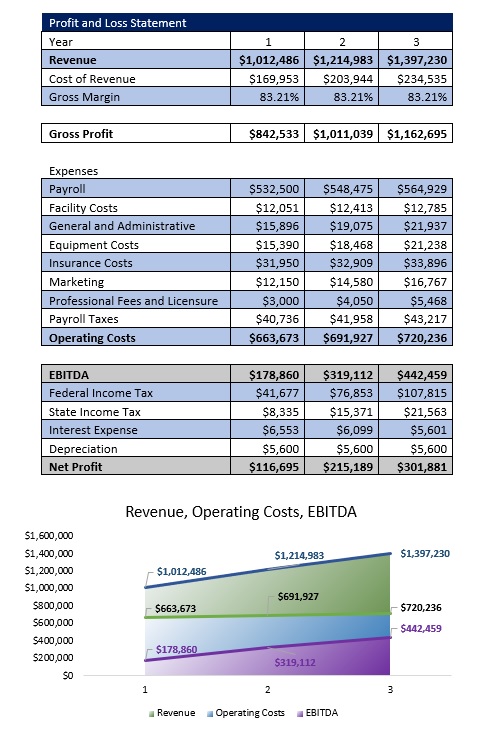
7.6 Cash Flow Analysis
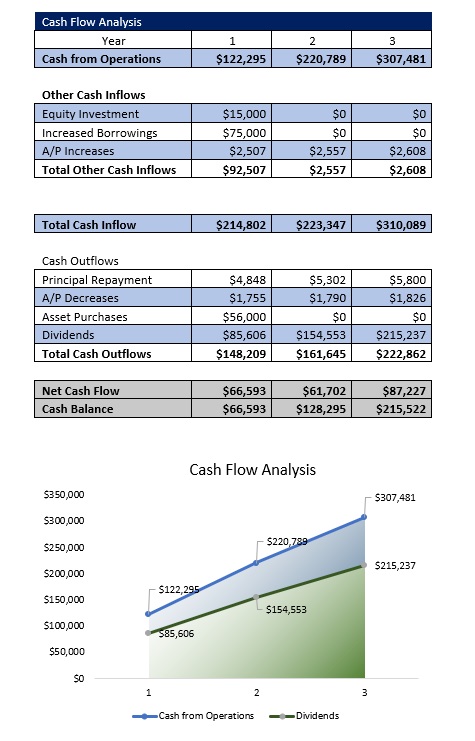
7.7 Balance Sheet

7.8 Breakeven Analysis
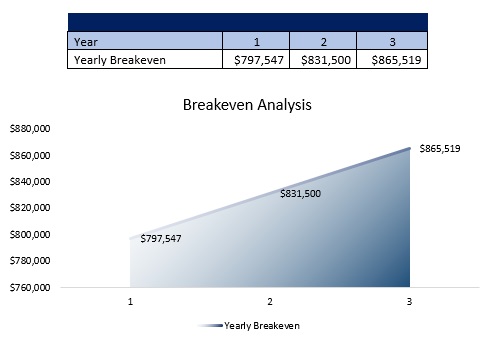
7.9 Business Ratios
